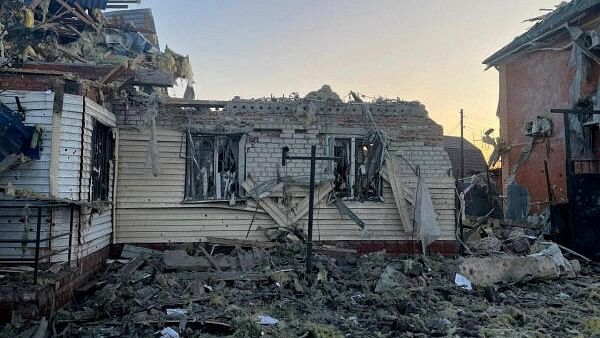
File photo of a damaged house following what local authorities called a Ukrainian military strike, in the course of the Russia-Ukraine conflict.
Credit: Reuters Photo
London: The chiefs of the CIA and the British Secret Intelligence Service, appearing together publicly for the first time in the history of their agencies, said Saturday in London that Ukraine's surprise offensive in the Kursk region had exposed vulnerabilities in Russia's military and was an "audacious" effort to "try and change the game" in the 2 1/2-year-old war.
"The Kursk offensive is a significant tactical achievement," said CIA Director William Burns. He said it had "put a dent" in the narrative propagated by Russian President Vladimir Putin that his country would grind down Ukraine and exploit divisions in the Western alliance to dictate the terms of a settlement.
Richard Moore, chief of the British service, also known as MI6, said it was "typically bold and audacious on the part of the Ukrainians to try and change the game," adding, "I think they have, to a degree, changed the narrative."
For two of the world's most powerful spy chiefs, it was a deeply unaccustomed setting: seated next to each other on a sofa, chatting about the most sensitive intelligence issues that their agencies face, before an audience gathered by the Financial Times at an annual festival, which features a Champagne-tasting tent and panels on subjects such as "How can we justify eating steak?"
Neither Burns nor Moore suggested that the Kursk offensive would change the course of the war. Russian troops have continued what Moore described as their "pyrrhic" march through Ukrainian territory. Both warned of dangerous new developments such as Iran's transfer of ballistic missiles to Russia, which Burns said would represent a "major escalation," although he did not confirm published reports that such a transfer of short-range missiles had already occurred.
But Ukraine's offensive was perhaps the most encouraging development in what Burns and Moore called a geopolitical landscape fraught with risks: from Russian intelligence agents in Europe who Moore said had "gone a bit feral," to the negotiations for a hostage deal with Hamas, which Burns said was now focused on producing a "good enough" proposal.
Both men were intent on showcasing the collaboration between the CIA and MI6. They pointed to the declassification of intelligence about Russia's plans to invade Ukraine before the war as an example of how the agencies had worked together -- and emerged somewhat from the shadows.
Both men have moved between the worlds of diplomacy and intelligence. Burns, 68, is a career diplomat who came to the CIA after serving as deputy secretary of state and ambassador to Russia. Moore, 61, came up as an intelligence officer before being appointed ambassador to Turkey.
Burns has also been heavily involved in trying to negotiate a deal to release Israeli and other hostages being held by Hamas in the Gaza Strip. He said the United States hoped to present a detailed proposal in the coming days, although he played down the prospects for success.
Although Burns said 90% of the text had been agreed to by Israel and Hamas, the last 10% was a hurdle. "The last 10% is the last 10% for a reason," he said, "because it's the hardest part to do."
"This goes to a question of whether or not leaders on both sides are prepared to recognize that enough is enough, and that the time has come for me to make some hard choices," Burns said.
Britain, under its new Labour government, has parted company with the United States on the Israel-Hamas war. It announced last week that it would suspend exports of some weapons to Israel, citing a legal review that concluded the weapons could be used in a way that would breach humanitarian law.
On Ukraine as well, Britain has leaned further than the United States in its support of the Ukrainian military, expressing a willingness for its Storm Shadow missiles to be used in strikes on military targets inside Russia. President Joe Biden has voiced fears that strikes inside Russian territory could escalate the conflict.
Burns and Moore steered clear of discussing those differences, keeping the focus on common enemies such as Putin. Moore said Russia continued to try to destabilize European countries with intelligence operatives, who he said were waging an increasingly reckless campaign of sabotage.
For his part, Burns said the CIA was "very sharply focused" on the threat of Russian agents operating in Mexico, where there are reports that they are trying to encourage illegal migration into the United States, as a way to destabilize the country during a presidential election year.
"Part of that is a function of so many Russian agents kicked out of Europe," Burns said. "So they are looking for somewhere to go instead."